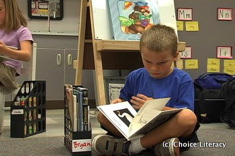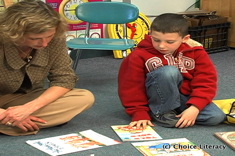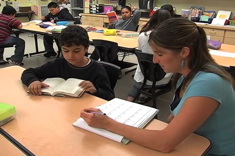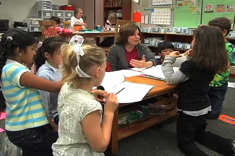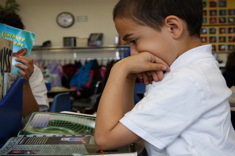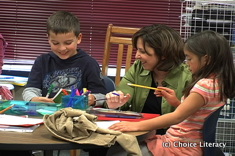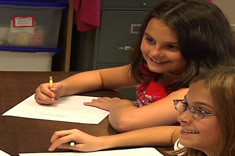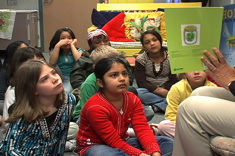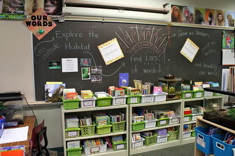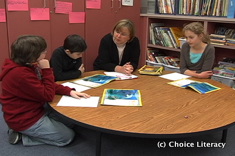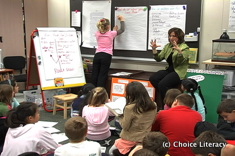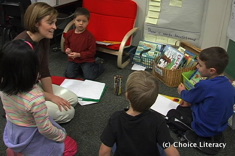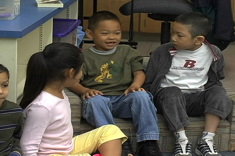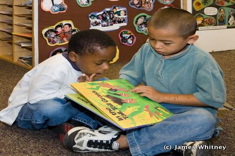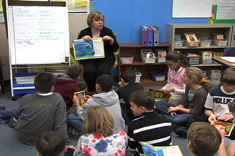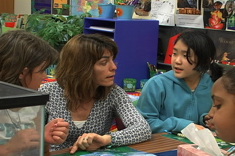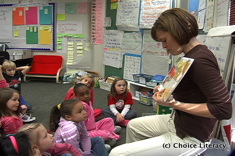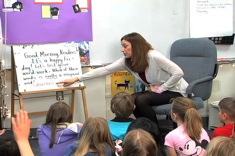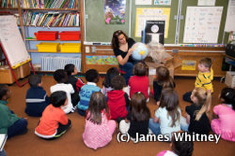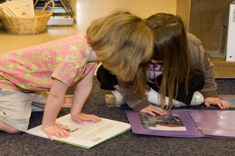Teaching Reading
Our contributors lead reading workshops in classrooms with creative flair. Over the past 12 years, we've filled our site with loads of suggestions, tools, and tips for using engaging books throughout the curriculum to hook kids on reading. Here is where you will find many stories of successful and not-so-successful workshop days, and what we learned from them. We bring these stories to life through hundreds of video examples.
Latest Content
Book Boxes – Voices from the Classroom
How do you organize and use book boxes? Every teacher has their own twist on the answer to this question. Choice Literacy contributors give examples from grades 1-5 of how they use book boxes and bags with their students.
“This Could Be Our Family”: Books for Children with Lesbian and Gay Parents
Andie Cunningham considers the diversity in how “families” are defined in children’s literature, as well as how some newer books can support children with lesbian or gay parents in our new booklist.
Is “Just Right” Still Just Right?: Helping Children Select Appropriate Books
Clare Landrigan and Tammy Mulligan consider how the incredibly useful and widely accepted “just right” term can sometimes limit how students think about book selection and their identities as readers. This essay includes sample lessons to help expand the ways young readers think about and discuss their reading preferences.
A Thanksgiving Take on Differentiating Instruction
Kathy Collins looks around the holiday table and discovers that differentiating instruction is similar to hosting a Thanksgiving feast.
Giving Up the Whole-Class Novel
When teachers shift to a reading workshop model, sometimes they struggle most with the move from whole-class novels to more individualized reading. Shari Frost has advice for helping teachers work through the transition, as well as ways to ensure students still have some shared reading experiences with their classmates.
When Does Level Matter? Being Efficient with Small Group Instruction
When does level matter in grouping students for reading instruction?  Franki Sibberson shares her latest thinking and a template to use in organizing groups.
Rethinking the Study of Nonfiction in the 21st Century
Franki Sibberson reflects on her nonfiction writing unit, and realizes she emphasizes research skills at the expense of the craft of nonfiction writing. She explains how she revamps the unit to help students focus more on writer's craft in nonfiction texts, including some new mentor texts and different ways of using writer's notebooks.
Using Picture Books to Teach Theme in Grades 3-6
Many students in the upper elementary and middle school grades shun all picture books, yet they are an invaluable resource for teaching sophisticated literacy concepts. Franki Sibberson explains how to teach the concept of theme using picture books in this booklist.
The Joy of Letter Writing: An Integrated Unit for Intermediate Students
Letter writing isn't a lost art in Mary Lee Hahn's 4th grade classroom. This unit has timeless appeal for students of all ages.
Literacy Learning on Presidents Day (BOOKLIST)
Here are some books to spice up your teaching in February on Presidents Day, or any time U.S. presidents come up in your curriculum.
Books That Invite Thoughtful Conversation in Grades K-2
Nothing beats an engaging and fun text to spark conversations among young children. Here are some suggestions of terrific read-alouds to get the chatter started in classrooms.
Living Words: Integrating Word Study, Technology, and Content Literacy (Part 1)
Living Words is a quick routine from Andrea Smith that helps students see the power of rich vocabulary for describing the natural world around them.
Our Living Minute: Integrating Nonfiction Study into Morning Meetings
Teachers can accomplish plenty in a minute if they want to add more nonfiction to their day. Learn how from Andrea Smith.
The Importance of Book Clubs for Learners of Any Age
Karen Terlecky brings lessons from her adult book club to her structure of book clubs in her 5th grade classroom. The article includes launching and management tips.
Expanding the Ways We Preview Books
Franki Sibberson discovers new ways technology can expand and enrich how students preview books.
Countdown: Keeping Children at the Center of My Plans for the New Year
Cathy Mere reminds us that the excitement of facing new students is always tempered and enriched by the lessons from last year’s students that we carry with us.
Picture Books for Shared Reading
Shared reading builds skills and community in Katie DiCesare's 1st grade classroom.
Word Storms: Integrating Nonfiction, Word Study, and Technology
Word Storms help students see the power of rich vocabulary for describing the natural world around them. While Andrea Smith is working with 4th graders, the activities can be adapted for older or younger students.
Book Basket Idea: Cars and Trucks
Katie DiCesare remembers books that were fought over among the boys in her 1st grade classroom, and this leads to creating a new basket for the fall on cars and trucks. She shares a booklist of fun titles in the basket.
Bilingual (English/Spanish) Books that Celebrate Language, Family and Culture
Stella Villalba shares her favorite bilingual (English/Spanish) books for helping young English language learners feel at home in new classrooms early in the year.
Not Available in a Six-Pack: Books to Place Alongside Leveled Texts for Our Youngest Readers
Teachers of young children often face the difficult choice of using leveled books that aren't necessarily engaging, or children's literature that isn't as easy to peg for readability. Franki Sibberson is on the hunt for wonderful children's literature that can easilysupplement or replace those lowest level "six-packs" of texts.
Thinking About 5th Grade Read Alouds
Karen Terlecky develops a plan for read alouds with her 5th grade students. She explains her choices, comparing selections to last year's list.
Towards Thoughtful Strategy Instruction
Sometimes the pendulum swings so hard in education that it’s hard not to feel whiplash. Shari Frost considers critiques of strategy instruction, analyzing what’s valid and what’s not in attacks on the flurry of post-its in classrooms.
Expedition Mondays: Launching the Week with Nonfiction
Expedition Mondays launch every week in Andrea Smith's classroom with a healthy dose of nonfiction.
Accurate But Not Quite Fluent: Books for Second-Grade Readers in Transition
Many second-grade readers are in transition – they can decode almost any text and are eager to read chapter books. Yet many don't have the stamina for reading even very short chapter books on their own. Katie DiCesare presents a booklist of her top picks of new fiction and nonfiction books that might engage and challenge her second-grade students.
Punctuation Study with Third Graders
Mandy Robek finds a punctuation unit study with her third graders is a fun alternative to yet another genre study. Her essay includes booklists of children's literature and professional texts.
Engaged by the World: Maps, Globes, Reading, and Writing with Young Children
Kelly Petrin and Ruth Shagoury connect globes and children's literature with a map theme to inspire young children to write more and include visual representations in their drafts. While the examples are from a Head Start classroom, the booklist and activities are appropriate for any K-2 students.
Twitter Me This: Using Cell Phones to Build Literacy Skills and a Reading Community
Lisa Koch found herself a bit irritated as her high school students would discreetly send text messages as she tried to teach them literary terms. Her solution? Tweet tweet! You can read here about her successful summer experiment of tweeting literary terms and staying in touch with students over summer reading assignments.
Unlucky Lists: Raising Non-Writers and Non-Artists
These lists created by S. Rebecca Leigh are a fun way to size up the messages we send students about reading, writing, and drawing, and how these may influence lifelong literacy habits.
Where Am I?: The Power of Wordless Photo Books for Preschoolers
Melissa Kolb shares the power of wordless photo books with preschoolers, explaining how they work in her classroom and demonstrating with a video.
Browse Content By
Type
Category
- Assessment Tools
- Big Fresh Archives
- Booklists
- Choice Numeracy
- Classroom Design
- Common Core
- Community Building
- Conferring
- Content Literacy
- Digital Literacy
- English Language Learners
- Equity
- Family Relations
- Free Samples
- Guiding Groups
- Leadership
- Literacy Coaches
- Mentor Texts
- Minilessons
- New Teacher Mentors
- Podcasts
- Poetry
- Quote Collections
- Reading Strategies
- Self Care
- Struggling and Striving Learners
- Talking and Listening
- Teacher Study Groups
- Teaching Reading
- Teaching Writing
- Word Study and Vocabulary
Author
- Melissa Quimby
- Nawal Qarooni
- Gwen Blumberg
- Julie Cox
- The Lead Learners
- Hannah Tills
- Josie Stewart
- Ruth Metcalfe
- Mallory Messenger
- Becca Burk
- Jodie Bailey
- Vivian Chen
- Mary Brower
- Tiffany Abbott Fuller
- Stephanie Affinito
- Ruth Ayres
- Leigh Anne Eck
- Heather Fisher
- Shari Frost
- Julie Johnson
- Suzy Kaback
- Gigi McAllister
- Shirl McPhillips
- Melanie Meehan
- Cathy Mere
- Debbie Miller
- Tara Barnett and Kate Mills
- Tammy Mulligan
- Dana Murphy
- Bitsy Parks
- David Pittman
- Brenda Power
- Heather Rader
- Matt Renwick
- Mandy Robek
- Christy Rush-Levine
- Gretchen Schroeder
- Jen Schwanke
- Brian Sepe
- Katherine Sokolowski
- Stella Villalba
- Jennifer Vincent
Grade Level
Choice Literacy Membership
Articles
Get full access to all Choice Literacy article content
Videos
Get full access to all Choice Literacy video content
Courses
Access Choice Literacy course curriculum and training

